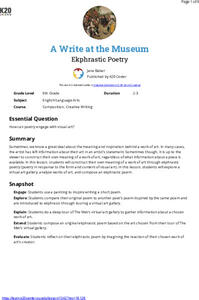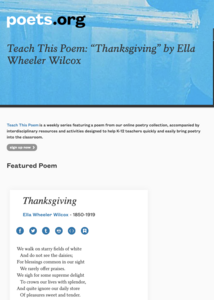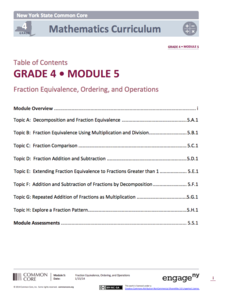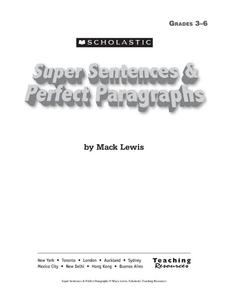K20 LEARN
A Write At The Museum: Ekphrastic Poetry
Which came first—the painting or the poem? In this case, it is the painting. Scholars closely examine a work of art and then craft an ekphrastic poem in response. A carefully scaffolded nine-page plan leads young poets through the process.
Academy of American Poets
Teach This Poem: “Thanksgiving” by Ella Wheeler Wilcox
Victor Laredo's painting "On the Beach" and Ella Wheeler Wilcox's poem "Thanksgiving" allow young scholars to use their noticing skills. Class members identify elements of the painting the artist uses to create the feeling of...
Curated OER
Express Yourself Lesson Seed 9: Climax
Conduct a close reading of chapter 9 of The Cay. Read the chapter again and ask pupils to respond to a list of included text-dependent questions. Finish the class with the provided writing assignment, which asks learners to use textual...
Curated OER
Express Yourself Lesson Seed 8: Character
Characters often change over the course of a story or novel. Use the sample graphic organizer provided here to track how the narrator has responded to the sequence of events in chapter four through six of The Cay. In addition to this...
Azar Grammar
Students as “Grammarians”: Discovering Grammatical Rules Lesson on the Causative “Have”
Groups examine a series of examples, identify the common elements, and work together to discover "the causative" grammar rule represented.
Channel Islands Film
Lone Woman of San Nicolas Island: Lesson Plan 3
Should researchers be able to excavate, examine, and remove Native American artifacts from historic sites? Should companies be permitted to build on sacred Native American land? After watching West of the West's documentary, The Lone...
Heritage Foundation
The Amendment Process and the Bill of Rights
Did you know that lawmakers have proposed more than 5,000 bills to amend the US Constitution in Congress? Your class learns intriguing facts about the process of choosing amendments. A variety of activities including before and after...
EngageNY
Fraction Equivalence, Ordering, and Operations
Need a unit to teach fractions to fourth graders? Look no further than this well-developed and thorough set of lessons that takes teachers through all steps of planning, implementing, and assessing their lessons. Divided into eight...
Core Knowledge Foundation
First Grade Skills Unit 5
Twenty-two lessons make up a unit that focuses on first-grade skills. Scholars examine spelling alternatives—their rules and patterns, practice tricky spelling and high-frequency words, explore plural nouns and sentences, read a...
Core Knowledge Foundation
The Human Body Tell It Again!™ Read-Aloud Anthology
A read-aloud anthology showcases various stories about the human body. Scholars participate in lessons that introduce a reading, listen to and discuss the reading, then complete in-class and at-home practice.
Trinity University
The Shakespearean Sonnet
Looking for a great lesson to teach your class everything they need to know about Shakespearean sonnets? Here's such a lesson. "Sonnet #18" launches a study of the Shakespearean sonnet. Scholars watch two Prezi presentations that provide...
Core Knowledge Foundation
Kindergarten Skills Unit 4
Fifteen lessons make up a unit that focuses on letter-sound correspondence. Beginning readers examine letters and their sounds. Scholars complete a review, an engaging activity, watch teacher modeling, and practice concepts. Lessons...
Core Knowledge Foundation
First Grade Skills Unit 2
Nineteen lessons make-up a four-week-long unit that explores long vowel sounds, nouns, and 11 high-frequency words. Lessons scaffold information to gain confidence in reading a decodable text and answering questions. Routines include...
Core Knowledge Foundation
First Grade Skills Unit 1
First graders participate in skills practice with 32 lessons focusing on sound-spelling correspondence—sound combinations, consonant digraphs, double letter sounds, tricky spellings, and words. Lessons begin with a warm-up, review and...
Novelinks
Words by Heart: Question Answer Relationship
Even though readers investigate matters of the heart, this activity promotes the inner workings of learners' brains. The fifth lesson of six has the teacher first model the strategy to the class before having small groups practice. To...
Scholastic
Super Sentences & Perfect Paragraphs
An extensive collection of lessons and activities includes many writing, grammar, and proofreading exercises. With templates and worksheets that cover several steps in the writing process, from sentence to paragraph to essay, this...
EngageNY
End of Unit 1 Assessment: Analyzing an Excerpt from Barack Obama’s Back-to-School Speech
In order to assess their mastery of the concepts taught in a 12-lesson plan unit study of Christopher Paul Curtis' Bud, Not Buddy, individuals read excerpts from President Barack Obama's 2009 Back-to-School Speech and use the strategies...
Core Knowledge Foundation
Unit 1: Contemporary Fiction - They Call Me Güero: A Border Kid’s Poems by David Bowles
They Call Me Güero: A Border Kid's Poems by David Bowles is the focus of a five-week language arts unit unit. Fifth graders listen to various poems and participate in thoughtful discussions, examining vocabulary and learning new words in...
Howard Hughes Medical Institute
Classroom Activities: Stem Cells and Diabetes
A multi-faceted lesson immerses AP biologists into the world of the stem cell. Using PowerPoint presentations, you introduce your class to diabetes and the possibility of finding cures through stem cell research. Online animations and...
Facing History and Ourselves
The Challenge of Confirmation Bias
Confirmation bias makes it difficult to overcome our preconceived notions of others. That's the big idea in a lesson that teaches learners strategies to recognize and question their biases.
Core Knowledge Foundation
First Grade Skills Unit 7
The last unit in the series by Core Knowledge focuses on alternative spellings, nouns, verbs, conjunctions, subject-verb agreement, using commas in a series, constructing sentences, and following the writing process while writing...
Baylor College
Tools of Magnification
Life science learners need to be able to use a microscope. With this comprehensive resource, they first experience how lenses and magnification work, and then get familiar with using a compound microscope. Tremendous background...
Pace University
Grade 6-8 Living Things
What characterizes a living thing? Scholars explore the concept during a differentiated instruction unit on living things. They perform lab experiments to determine how animals adapt to stimuli, watch videos and learn about...
Core Knowledge Foundation
Kindergarten Skills Unit 10
A six-week unit wraps up kindergarteners' skills practice in beginning reading skills. Twenty-nine lessons focus on long vowel sounds and 11 tricky high-frequency words. Scholars participate in warm-up activities, introductions to sounds...























